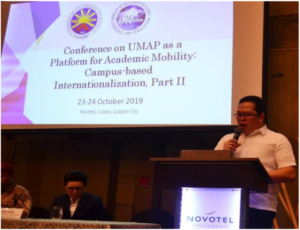06-Nov-2019 Conference on UMAP as a Platform for Academic Mobility: Home-Based Internationalization, Part II
Conference on UMAP as a Platform for Academic Mobility: Home-Based Internationalization, Part II
The Commission on Higher Education and the UMAP Philippines Council co-hosted the conference on “UMAP as a Platform for Academic Mobility: Home-based Internationalization, Part II” on 23-24 October 2019 at Novotel, Cubao, Quezon City.

The conference provided a multidisciplinary forum to discuss the prime movers of academic mobility, look beyond the standard full-program or semester-based study abroad mobility and focus on the benefits of internationalization “at home,” understand the complex phenomenon and identify emerging issues and trends of student mobility here and abroad, and increase awareness on the future scenario of academic mobility among UMAP members and the accelerated pace of change in international education.
The UMAP conference was attended by 120 participants from UMAP member HEIs, UMAP Philippines Council Board, resource speakers from Indonesia, Japan, Thailand and the Philippines, and CHED officials.
CHED Commissioner, Dr. Aldrin A. Darilag emphasized that the role of the CHED and the UMAP is to make Internationalization of higher education an integration of intercultural learning accessible to students especially through campus based or home-based internationalization programs which requires commitment towards this endeavor.
Dr. Lourdes Nepomuceno, President of UMAP Council Philippines, stated that both the CHED and UMAP are the hub of relevant and meaningful Internationalization and the sharing from speakers can help HEIs appreciate and put into focus campus-based internationalization.
Dr. Donludee Jaisut from Kasetsart University, Thailand gave tips on internationalization. She said that first, find your expertise and be ranked accordingly; second, design international programs for students to choose ranging from bachelor’s degree, master’s degree, or PhD; third, be prepared to have competitive buildings and facilities; fourth, an international dormitory is required if you want to house inbound foreign students and fifth, choose partner universities for exchange programs which may either be short term or long term, like research collaborations.
Ms. Naoko Kimoto from UMAP International Secretariat Japan enlightened the participants on the easy way to get into Programs A&B, Program C and the Research Net. She informed the body that there are UMAP Scholarships given by the Japanese government for short term and semester long courses, while the Taiwanese government offers scholarship for semester long courses.

